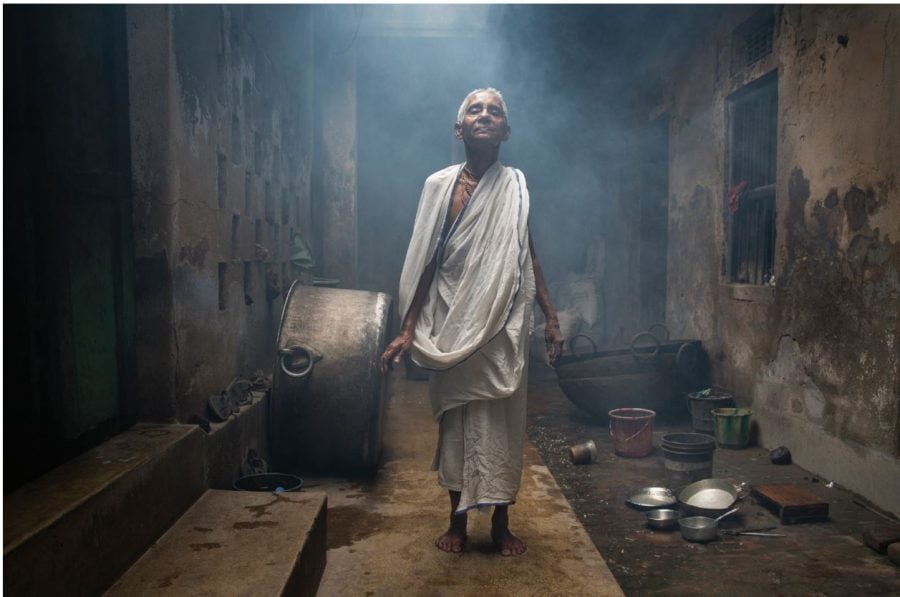Photojournalist, Amy Toensing, to visit campus and share experiences
Nabadwip, West Bengal, India – April 5, 2016: Bhakti Dashi, 75 years old from Bangladesh, says she has been living in Nabadwip Bhajanashram ashram since Bangladesh Independence around 25 years ago. Bhakti lives in the back area of the ashram, behind the temple with a few other widows. During they day other widows come to the ashram to pray and chant in exchange for food. // Photo courtesy of Amy Toensing
Imagine one day you had most of the necessities you needed and the next day everything is gone.
When their husbands die, women in Nepal, India and Bangladesh lose their homes and families. Photojournalist Amy Toensing documented these women’s stories in her most recent project, “A World of Widows,” for National Geographic, sponsored in part by the Pulitzer Center on Crisis Reporting.
Photojournalist Toensing has traveled around the world to capture important, storytelling photographs to share the stories of cultures, continents and their people.
“The importance of storytelling goes way beyond photography,” said Toensing. “Humans process the world through stories, and you can tell … (them) in a lot of different ways. How we learn is through stories. It is how we understand and how we connect to humanity.”
Toensing emphasized the importance of photojournalism.
“Photojournalism is incredibly important,” said Toensing. “The still photograph is arguably more powerful than the written word. There is a saying that a picture is worth a thousand words. It’s a universal language.”
Being able to make an emotional connection with the audience as well as the subject is crucial, Toensing said. For the audience to feel something, the photographer needs to be sure the subject is comfortable, knows what is happening and knows about the photographer.
“The more you connect with your subject, the more you are going to connect with your audience,” said Toensing. “For myself as a storyteller, the deeper the connections I make with my subjects, the deeper my audience is going to connect with my story.”
Some of Toensing’s projects include the “Last of the Cave People,” published in National Geographic Magazine in November 2012. Toensing worked in Papua New Guinea.
Toensing works to expose different cultures to the rest of the world. She has also covered Hurricane Katrina and Muslim women living in Western culture. Her work has been in The Boston Globe, The Wall Street Journal, Time and Smithsonian magazine.
Her career began when she started working at her hometown newspaper, The Valley News, in New Hampshire. She later worked for The New York Times covering the White House of President Bill Clinton.
Toensing participates in VisionWorkshops, an organization that works with underserved communities and teaches children and adults about photography. Toensing has worked with kids, including Somali and Sudanese refugees in Maine and Burmese refugees in Baltimore. The work she does with VisionWorkshops is similar to the work students do at The Bonner Center, working with different refugees and immigrants around Greensboro.
Toensing shares her photographs from “A World of Widows” in a presentation on Monday, April 3, in the Carnegie Room at the Hege Library at 7:30 p.m. It’s free and open to the public. A welcome reception at 7 p.m. precedes the lecture.
Jennie Knight, director of engaged teaching in the Center for Principled Problem Solving, invited Toensing to visit her class on Monday morning, April 3.
“The class is about ethical leadership and social change innovation,” said Knight. “I am looking forward to hearing her story about how she is able to continue sharing important issues through photography. I am interested to hear how she is able to sustain herself over time and be able to continue to go into difficult situations to share the stories of many people that are not able to.”
Her visit to Guilford College is part of the College’s relationship with The Pulitzer Center for Crisis Reporting. Guilford is a part of the Pulitzer Campus Consortium that networks college campuses to make them aware global issues.
Executive Director of the Pulitzer Center for Crisis Reporting Jon Sawyer talked about the importance Amy’s work and how her visit to Guilford will inspire many students to connect, learn and become more aware of global issues with women.
“The project we did with Amy and Cynthia Gorney, “A World of Widows” is like the many other projects we have done at the Pulitzer Center,” said Sawyer. “Amy’s project involving women and children is a big topic with different people around the world.”
Sawyer said Toensing was a great fit for Guilford because of the overlap between the work the college does with global issues.
“Guilford is a great liberal arts college,” said Sawyer. “It’s always very globally engaged and a college that puts a strong emphasis on arts. I think that students will find Toensing very inspiring as an example of what you can do with your career to make a difference in the lives of many people.”








